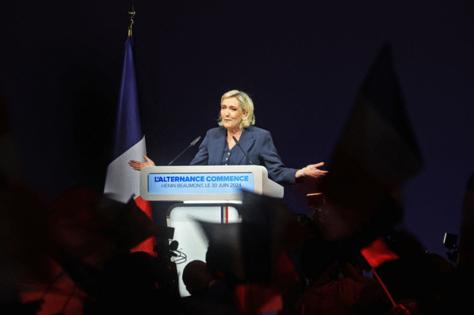Le Pen's bid for president threatened by Paris court ruling
Published in News & Features
Marine Le Pen, leader of the National Rally party, will find out on Monday whether she’ll be banned from running for president in 2027 as Paris judges rule on an embezzlement case that’s put her political future in jeopardy.
An immediate ban — sought by prosecutors — is a very real risk for Le Pen if she and her party are found guilty of diverting millions of euros in European Union funds to finance activities related to their domestic agenda.
If prosecutors get their way, she wouldn’t get the chance to have her sentence put on hold while challenging the verdict. Le Pen has denied any wrongdoing and said the prosecution is seeking her “political death.”
“I read here and there that we are nervous,” Le Pen said in comments to newspaper La Tribune Dimanche. “Personally, I am not, but I understand how you could be,” she said. “The judges have the power of life or death over our movement but I don’t think they will go that far.”
The far-right politician would be a leading candidate if she entered the race to replace President Emmanuel Macron, who can’t run for a third term. Her approval ratings have been gradually swelling and her party nearly tripled its number of seats in parliament last year. Donald Trump’s return to the White House adds extra interest to Le Pen’s case. He won a second term with a clutch of criminal cases hanging over him and, like Le Pen, has made trenchant opposition to immigration a cornerstone of his program.
In France, it’s unclear how voters would react to a conviction for misusing funds in a case that has been cast by Le Pen allies as a witch hunt. An outright ban might make the decision for them.
Her media office didn’t immediately respond to a request for comment. Senior National Rally officials declined to comment.
The Le Pen ruling comes after France’s Constitutional Court on Friday backed the legality of ordering the immediate application of an electoral ban in a separate case that involved a local councilor.
The constitutional ruling highlights the degree of discretionary power criminal judges have in France when deciding whether a ban is applicable straight away, according to public law specialist Ferdinand Mélin-Soucramanien.
“There needs to be a balance between the seriousness of the ethical breach and the freedom of the voter,” said the professor from the Université de Bordeaux.
During court hearings last year, Le Pen and other party members elected to the European Parliament were accused of improperly using a budget allocation for EU aides. French investigators said the money was used to pay staff of the Front National — the party’s former name — who focused essentially on domestic politics, rather than EU matters.
The prosecution team recommended an outright electoral ban lasting five years for Le Pen. They said it was justified because the alleged wrongdoing lasted for more than a decade and the amount allegedly misused totaled about €4.5 million ($4.9 million).
The prosecution argued that Le Pen should also get a €300,000 fine and a two-year jail term, but suggested it could be served with an electronic bracelet.
Le Pen said after the hearings at the Paris criminal court that prosecutors were “trying to deprive the French people of the ability to vote for the people they want” and her lawyer called the ban recommendation “a weapon of mass destruction of the democratic process.”
Marine Le Pen has led the movement founded by her late father, Jean-Marie, through various incarnations since 2011.
Le Pen’s transition from fringe to front of pack has much to do with her willingness to renounce her political heritage — including the positions of her father, whose overt racism and divisive rhetoric ultimately condemned him to political oblivion.
She has assiduously sought to “de-demonize” her party and reassure business about her economic policies in recent years. She’s been aiming to capitalize on that transformation to claim the presidency, after finishing second to Macron in the 2017 and 2022 presidential runoffs.
The EU funds trial may collide with that goal. An appeals court decision before the 2027 election isn’t totally out of the question if either side pursued a challenge to Monday’s outcome. But it’s unlikely given the complexity of the case and number of defendants.
(Samy Adghirni and William Horobin contributed to this report.)
©2025 Bloomberg L.P. Visit bloomberg.com. Distributed by Tribune Content Agency, LLC.







Comments